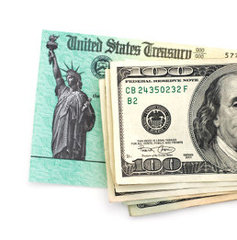Credit card debt: The less you pay, the more it costs
Published 3/30/11 (Modified 4/21/11)  By Richard Barrington
By Richard Barrington
In George Orwell's "1984," the totalitarian regime often confused the populace by using contradictory phrases such as "war is peace" and "freedom is slavery." The common credit card term "minimum payment" might contain a similar sort of contradiction, because by making minimum payments, you'll find yourself shelling out the maximum amount of money.
The reason is that the longer it takes you to pay down a credit card balance, the more interest you will pay on that balance. Thus, making the minimum payment each month will mean racking up more in the way of interest charges. Just how much more may surprise you.
The true cost of minimum payments
Suppose you shell out $1,500 for a home theater system. It's a big investment, so you put it on your credit card so you can pay it off over time.
For this example, let's assume your credit card charges a minimum payment equal to the larger of 3 percent of your outstanding balance, or $10. These are fairly typical minimum payment terms.
Under those terms, if you make just the minimum payment every month (and assuming you add nothing else to your balance) it will take you over ten years to pay off that $1,500 purchase. Meanwhile, interest charges, at a fairly typical 15 percent rate, would have totaled $810.41. Thus, you would have increased the total cost of that
Read the full article » By Joe Taylor Jr.
By Joe Taylor Jr.  By Tom Tennant
By Tom Tennant  By Jim Sloan
By Jim Sloan  By Jim Sloan
By Jim Sloan  By Jim Sloan
By Jim Sloan